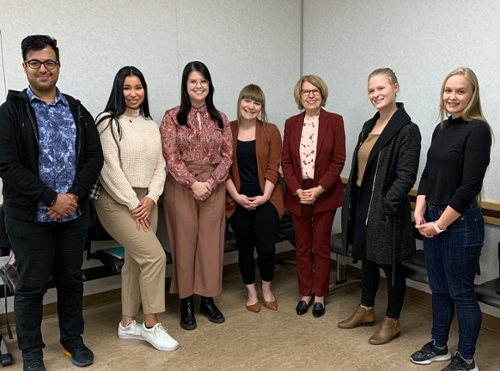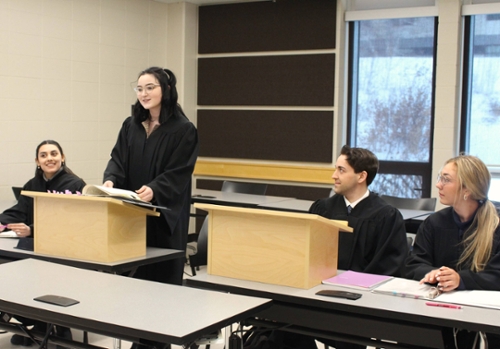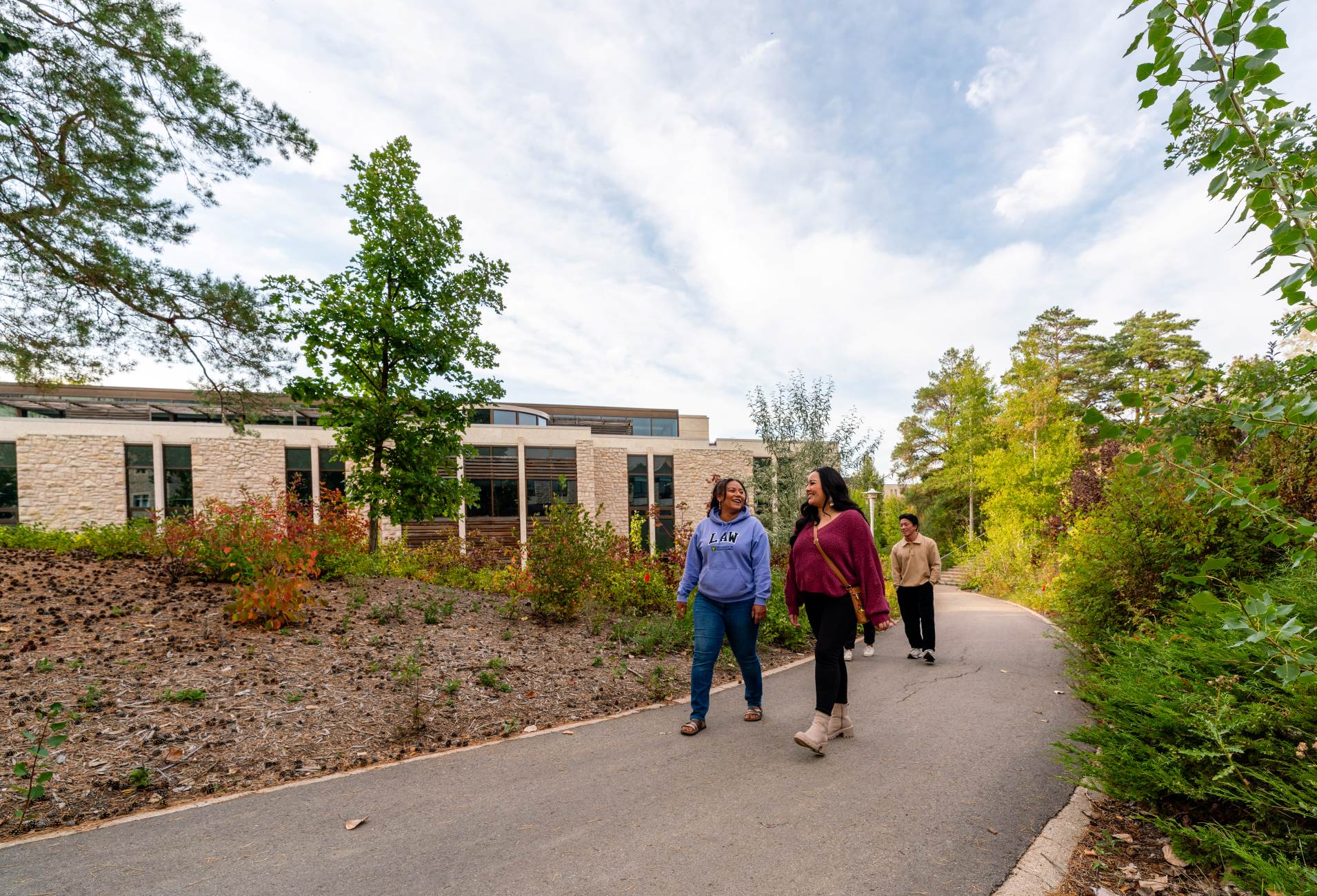Advantages
Our Experiential Education Program offers a dynamic blend of practical training and theoretical understanding, empowering students to thrive as future professionals. Experiential education opportunities are designed to enrich students' academic journeys and adhere to principles of sound legal education pedagogy, ensuring a comprehensive and effective learning experience. Here's what sets our program apart:
-
Real-World Application: Dive into the heart of legal practice through a diverse range of courses and experiences. From moot court competitions to internships and study abroad opportunities, students will have the chance to tackle real legal issues under the guidance of experienced professionals.
-
Tailored Experiences: No matter your interest area—whether it's child protection law, criminal law, start-up law, or beyond—we cater to diverse passions and career aspirations.
-
Professional Guidance: Benefit from mentorship and guidance from knowledgeable legal practitioners as you navigate complex legal scenarios and hone your skills.
Handbooks
For students
More about the structure, policies, expectations and resources to support your participation in experiential education.
For supervisors
This guide provides practical resources and more information about expectations and best practices.
Opportunities

Experiential education lies at the heart of the College of Law’s innovative and highly successful Clinical Law program at Community Legal Services for Saskatoon Inner City (CLASSIC). This intensive clinical law program allows students to take on client files at CLASSIC under the close supervision of CLASSIC’s supervising lawyers and attend a weekly seminar course instructed by the Clinical Law professor, who coordinates the program and evaluates students. Students take on files in a broad range of areas of law, and are responsible for interviewing and counseling clients, preparing court documents, negotiating with opposing parties, and advocating for their clients before courts and tribunals.
Open to 2L and 3L students, this is a 15-credit, one-semester experience and includes the practicum and academic seminar. Applications are accepted each June. There will be an interview process to select students, and they will be informed of their acceptance into the program as soon as possible.

CREATE Justice or Centre for Research, Evaluation, and Action Towards Equal Justice was created in response to a call for action for a more accessible justice system in Canada. CREATE Justice works towards its goal of creating a more accessible justice system, through the implementation of new or existing projects, often through its in-house lab, aimed at making justice more accessible in a variety of ways. The CREATE Justice internship will give students an opportunity to learn about the process of justice system reform and to develop their research and writing skills by working with CREATE Justice and its Director on systemic justice reform projects in which the lab is engaged.
The Criminal Law Practicum and Seminar is designed to provide real world practical exposure to the practice of criminal law. Students will be exposed to a wide variety of criminal practice issues from the defense of criminal accused to the running of a criminal law practice. Students will be encouraged to reflect upon what they observe and will also learn about several advanced criminal law, ethical, evidence, trial advocacy and criminal procedure issues. The course is designed to represent a culmination of all that a criminal lawyer needs to know and will build on the student’s substantive knowledge in the discipline.
Open to 2L and 3L students, this is a 15-credit one-semester clinical course including practicum and academic seminar. Applications are collected each September.
Through the College of Law’s Dispute Resolution curriculum and experiential learning opportunities, students develop thoughtful, professional and skillful approaches to managing and resolving client problems and legal disputes.
The Dean's Forum on Dispute Resolution and Access to Justice is an is an initiative that engages justice community stakeholders in Saskatchewan in a dialogue about access to justice and the future of the justice system. The associated Dean’s Forum course, unique to the College of Law, offers law students a rare experiential learning opportunity to contribute to justice policy alongside these stakeholders, who are leading members of the legal profession.
Open to 2L and 3L students. Prior demonstrated leadership in dispute resolution and access to justice initiatives, as well as prior academic performance will be factors in the selection of students for the course. The course will be scheduled based on the successful candidates' availability. The course is typically offered in Term 2 for six upper-year students. Applications are accepted in the preceding fall term. Successful applicants will be required to attend several meetings before Term 2 to kick off the initiative.
The purpose of the Law Reform Commission of Saskatchewan is to review the law in Saskatchewan with a view to its systematic modernization and simplification. This internship will give students an opportunity to learn about the process of law reform and to develop their research and writing skills by working with the Commission and its director on law reform projects in which the Commission is engaged.

Mooting is an important part of the college's academic and professional program. Students interested in advocacy are given full opportunity to research and present positions in the college and at national and international mooting competitions. Not only are several upper-year moots available to apply to, as a component of the first-year Legal Research and Writing course, all first-year students will experience and participate in a moot.
Upper-year moots are three-credit courses and open to 2L and 3L students. Moot students often find the relationships, with the coaches and with their teammates, to be rewarding, and the hands-on work to be a refreshing change from the classroom. Applications are accepted in September each year. Tryouts are conducted shortly after the deadline has passed.

We invite you to apply for the Faculty of Law’s four new application based courses that will begin in Winter 2024. The courses will run within the same schedule of other winter courses and are only available to 2L and 3L students. The application deadline is Wednesday, January 10th, 2024.
LAW 498.3: Opus Startup Incubator Placement – This internship explores the legal aspects of business venture incubation, innovation and strategic supports in a technology-driven world. Situated within USask’s Opus startup incubator and under the supervisor of a practicing lawyer and startup coach, students will delve into the legal intricacies of fostering innovation, enterprise creation and operation, and forming collaborations to drive societal, industrial, and environmental advancements. The course is designed to equip students with the knowledge and skills needed to navigate the complex intersection of law, technology, and entrepreneurship (Prerequisite: LAW 410 - Intellectual and Industrial Property I).
LAW 498.3: Privacy and Access Placement – In this Privacy and Access Internship placement, students will examine how to apply the laws relating to the collection, utilization, and disclosure of information. Under the supervision of the University of Saskatchewan Legal Office, they will participate in activities such as training, meetings with committees, and interdepartmental collaboration that enhance their research and writing skills, apply critical analytical skills, help them understand how to navigate governance structures and due diligence processes. This experience will expose students to the areas of privacy, access to information, procurement, trade agreements, cyber security, and IT issues. There will be an emphasis on identifying and applying principles and legislative provisions to real-world scenarios essential to assess the rights, obligations, and potential liability of individuals and organizations (Prerequisite: LAW 310 - Information and Privacy Law or Special Permission).
Pro Bono Students Canada Saskatchewan Chapter places law students with community-based organizations, legal clinics and public interest groups that address the access to justice crisis. Each project is supervised by a practicing lawyer and provides students with the opportunity to apply skills learned in the classroom to meet legal needs as identified by partners in the community. As much as possible students are placed with projects that conform to their interests.
The College of Law offers students the opportunity to study at some of the top law schools in the world with many college-to-college agreements making the process of applying and receiving acceptance at host institutions easier. Students are welcome to apply to any approved Exchange Program.
Application-based Courses
Interested in our application-based courses? Here's what students need to know:
These courses offer specialized opportunities that complement your traditional academic curriculum. While enrolment isn't guaranteed due to the application process, we encourage you to apply and seize the chance to enhance your legal education, grounded in sound pedagogical principles. Please refer to each opportunity for specific application instructions. 2L and 3Ls will be automatically added to the 'USask College of Law | Experiential Learning' Canvas course in June. Accept the invitation to access the application system within the course and navigate to the 'Placement Applications' section to select and submit your application by each listed deadline.
Note: Even if you apply for application-based courses, ensure you register for a full complement of courses through PAWS. If accepted into any application-based course, you can adjust your schedule accordingly.
Contact
law.EL@usask.ca
